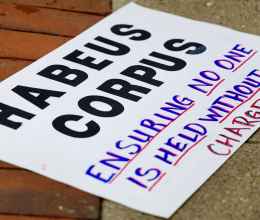
The Trump administration is quietly using a program called 287(g) to turn local police and sheriff’s departments into arms of its deportation machine.
This week, the Trump administration hit a milestone of 1,000 participating state and local agencies. Immigration and Customs Enforcement (ICE) is aggressively recruiting for this deportation-collaboration program. It is now offering cash to local police in exchange for “locating” our immigrant neighbors, as it attempts to reach a level of deportations never before seen in our nation’s history.
President Donald Trump campaigned on the promise to remove 20 million people from the country. That's 5.8 percent of our population. This ambitious project – most visible in the masked deportation squads that are smashing car windows and forcing people into black vans – is likely to grow even more nefarious as ICE leeches on to local police to help it.
How Local Police Become Deportation Assistants
The 287(g) Program is a set of partnerships between U.S. Immigration and Customs Enforcement (ICE) and state and local agencies that effectively turns local officials into ICE agents, authorizing selected officers to identify, arrest, and process certain people for immigration enforcement and ultimately deportation.
Local law enforcement participating in the 287(g) program are redeployed from local public safety matters to be an ICE force multiplier. This could include interrogating anyone they believe to be a noncitizen about their right to be in the country and asking for their citizenship papers. It could mean that local jails continue to hold people – grandparents, caretakers and other long-time residents who lack legal status – beyond when they would otherwise be released after a minor infraction or posting bail until ICE comes to take them away. Local police officers become secretaries for ICE - doing paperwork and helping process people for deportations.
Many law enforcement leaders oppose 287(g) because it is a drain on local resources. It not only wastes police officers’ time, it also has led to costly lawsuits for constitutional rights violations, including wrongly holding US citizens. Numerous studies show that this program hurts public safety. People are less likely to come forward to seek police protection when they know calling 911 could result in their family member or friend being deported.
Record Number of Police Now Working With ICE
At the end of Barack Obama’s administration, there were just 32 participating state and local law enforcement agencies. That leapt to 152 in Trump’s first term, and the administration removed guardrails like expiration dates for participation agreements.
Joe Biden’s administration left the program largely intact, refusing to kick out participating law enforcement agencies with records of racial profiling and anti-immigrant abuse, despite calls from the ACLU and our partners.
Now, in just eight months of the second Trump administration, the number of local agencies opting to act as deportation force multipliers has grown by 600 percent. The program has encroached into states that until now had few or no participating agencies, such as Iowa, Maine, New Mexico, Utah, and West Virginia.
287(g) Program Expands in Dangerous New Ways
Congress first authorized 287(g) in 1996, permitting the federal government to delegate certain federal immigration enforcement responsibilities to designated state and local officers, subject to training and close supervision by federal officials. Now, just as the Trump administration has moved to exploit other long-standing legal authorities, it has gone far beyond what Congress intended and morphed this program into a larger, cannibalizing force, the full implications of which we have yet to see.
In the coming months, we expect ICE to tap local police to join its multi-agency, masked deportation squads across the country. Already, in April, ICE boasted a “first-of-its-kind statewide operation” involving ICE and more than a dozen sheriff’s offices, the state of Florida, the FBI and other federal agencies. Blurring law enforcement agencies into a single, unaccountable deportation force is a recipe for civil rights abuses and government waste.
ICE has also illegally relied on 287(g) to detain people at the notorious “Alligator Alcatraz” detention center, a hastily constructed facility in the middle of the Florida Everglades, which is surrounded by alligators, snakes, mosquitos, and swampland. The ACLU and our partners recently filed a lawsuit on behalf of people detained there.
ICE has also penned agreements with state National Guards in Texas, Florida and West Virginia. It has tapped campus police departments and even agencies that are not law enforcement-oriented, like the Florida Department of Lottery Services.
Our Communities Are Fighting Back
We are seeing vocal opposition to agreements under consideration in communities nationwide. At a July meeting in\Utah County, Utah “the vast majority” of public input during a commission meeting on a 287(g) agreement was opposed – citing racial profiling, the risk of unidentified ICE agents, and “religious values of loving their neighbors.” In Miami, Florida, lines of people gathered hours before the meeting and delivered hours passionate public comments against the city joining the program. In Camden, Delaware, the city quietly approved an agreement and then backtracked and withdrew after robust public opposition. This led to the state passing legislation to ban these agreements state-wide.
If local governments choose to participate in the 287(g) program, despite community opposition, they can put limits and oversight on how local law enforcement is supporting federal deportation agents and how this impacts community members.
We expect demands for transparency and accountability to grow in the coming weeks and months – the longer we all witness the violence of the masked deportation squads, the more opposition to them will grow.







